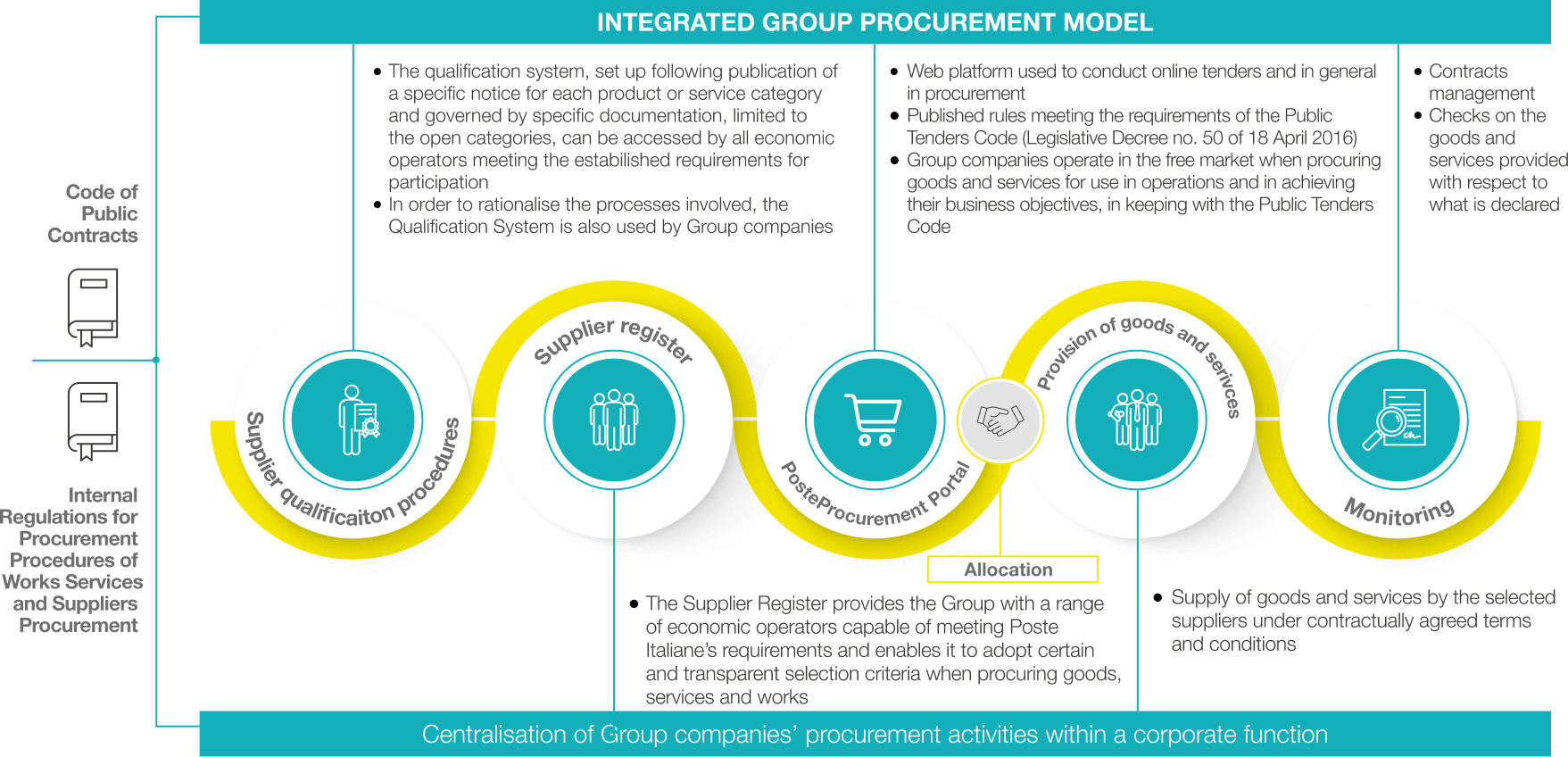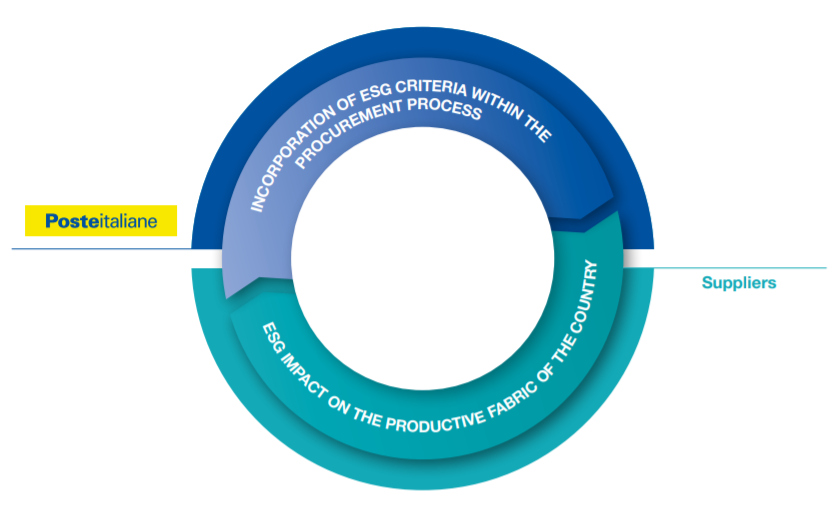Poste Italiane manages its supply chain responsibly, aiming to certify the sustainability, functionality and traceability of the materials purchased. To ensure this, in addition to complying with current regulations and company directives, the Poste Italiane Group is committed to basing its purchasing processes on pre-contractual and contractual relations based on the values of legality and transparency. Focusing on compliance with agreements, payment terms and deadlines, the Company includes in its supplier network those who demonstrate appropriate quality characteristics and are committed to protecting workers and complying with environmental standards.
The Poste Italiane Group guarantees each supplier the possibility of competing in award procedures, ensuring fairness and avoiding preferential treatment. Suppliers involved are obliged to comply with the EU and Italian legislation on competition, and shall refrain from anti-competitive or unethical conduct that is contrary to the rules that safeguard competition. In addition, the Company requires suppliers and any subcontractors, as well as their partners to formally accept the guiding principles and criteria of conduct outlined in the Code of Ethics and Group Policies.
Through internal rules, Poste Italiane regulates the purchasing process for contracts subject to the Public Contracts Code, and for those which are excluded from the scope of application of the Code itself.
With the aim of promoting and strengthening relationships with suppliers, as well as ensuring efficient and integrated management of the supply chain in compliance with the principles of confidentiality, authenticity, competitiveness, integrity and availability in data exchange, purchases are made through the PosteProcurement Purchasing Portal. The Portal is a telematic system dedicated to procurement activities and the management of the Supplier Register.

The Sustainable Procurement function is responsible for the timely monitoring of ESG issues within its supply chain management. This function ensures a constant integration of sustainability issues within tender processes and ESG criteria in the technical evaluation of offers. By defining highly relevant projects, such as logistics, the decarbonisation of properties, consumables, and promoting attention to the use of resources, investment plans and technological development, together with the green implementation of the most traditional, the goal of sustainable change can be achieved.
The Poste Italiane Group pays particular attention to the ESG aspects linked to the management of the supply chain, aware that establishing transparent and lasting relationships with suppliers, as well as paying maximum attention to quality, respect for the environment, safety and social implications in the procurement process, can contribute to the public interest of the entire country system1 and the continuous improvement of the service offered to its customers (during 2023, there were zero instances of supplier non-compliance with environmental policies and labor rights policies).
For this reason, there are specific environmental, social and governance criteria in the supplier selection process, in the participation requirements, in the evaluation parameters of the technical offer and/or in the contractual conditions, of the tender procedures carried out during the year. In particular, the Group provides for specific contractual clauses related to sustainability issues (e.g. human rights, health and safety at work, ethics, etc.) in its relations with its suppliers.
Confirming the Poste Italiane Group's constant attention to these issues, there were significant increases in the number of tenders carried out on the basis of environmental, social and governance criteria in 2023. Specifically, 87.9% of suppliers, compared to 84.5% in 2021, were selected in accordance with specific social standards during 2023. Said indicator, when considered net of tenders without a technical offer (as they were awarded to the lowest price), certifies that almost all tenders launched require social criteria (> 98%). On the other hand, 90.5% of the tenders issued in 2023, compared to 83.4% in 2021, meet certain environmental performance standards. Again, the percentage of tenders selected on the basis of these criteria would become greater than 99% if those without a technical offer were excluded from the calculation.
In the supplier qualification phase, in order to monitor their performance, Poste Italiane implemented a rating methodology characterised by the adoption of a customised approach, which resulted in the creation of an ad hoc questionnaire for each supplier (100% of qualified suppliers).
The information obtained is subsequently subjected to analysis and processing through the definition of an ESG scoring process which provides, for each aspect analysed, the attribution of a rating for each relevant risk and a total ESG rating.
These elements give the model the following strengths:

The Poste Italiane Group guarantees each supplier the possibility of competing in award procedures, ensuring fairness and avoiding preferential treatment. Suppliers involved are obliged to comply with the EU and Italian legislation on competition, and shall refrain from anti-competitive or unethical conduct that is contrary to the rules that safeguard competition. In addition, the Company requires suppliers and any subcontractors, as well as their partners to formally accept the guiding principles and criteria of conduct outlined in the Code of Ethics and Group Policies.
Through internal rules, Poste Italiane regulates the purchasing process for contracts subject to the Public Contracts Code, and for those which are excluded from the scope of application of the Code itself.
With the aim of promoting and strengthening relationships with suppliers, as well as ensuring efficient and integrated management of the supply chain in compliance with the principles of confidentiality, authenticity, competitiveness, integrity and availability in data exchange, purchases are made through the PosteProcurement Purchasing Portal. The Portal is a telematic system dedicated to procurement activities and the management of the Supplier Register.

The Sustainable Procurement function is responsible for the timely monitoring of ESG issues within its supply chain management. This function ensures a constant integration of sustainability issues within tender processes and ESG criteria in the technical evaluation of offers. By defining highly relevant projects, such as logistics, the decarbonisation of properties, consumables, and promoting attention to the use of resources, investment plans and technological development, together with the green implementation of the most traditional, the goal of sustainable change can be achieved.
Selection of suppliers
To select its suppliers, the Group is guided by objective and verifiable criteria, including ESG criteria, with the aim of ensuring fairness, impartiality, transparency and equal opportunities for collaboration.The Poste Italiane Group pays particular attention to the ESG aspects linked to the management of the supply chain, aware that establishing transparent and lasting relationships with suppliers, as well as paying maximum attention to quality, respect for the environment, safety and social implications in the procurement process, can contribute to the public interest of the entire country system1 and the continuous improvement of the service offered to its customers (during 2023, there were zero instances of supplier non-compliance with environmental policies and labor rights policies).
For this reason, there are specific environmental, social and governance criteria in the supplier selection process, in the participation requirements, in the evaluation parameters of the technical offer and/or in the contractual conditions, of the tender procedures carried out during the year. In particular, the Group provides for specific contractual clauses related to sustainability issues (e.g. human rights, health and safety at work, ethics, etc.) in its relations with its suppliers.
Confirming the Poste Italiane Group's constant attention to these issues, there were significant increases in the number of tenders carried out on the basis of environmental, social and governance criteria in 2023. Specifically, 87.9% of suppliers, compared to 84.5% in 2021, were selected in accordance with specific social standards during 2023. Said indicator, when considered net of tenders without a technical offer (as they were awarded to the lowest price), certifies that almost all tenders launched require social criteria (> 98%). On the other hand, 90.5% of the tenders issued in 2023, compared to 83.4% in 2021, meet certain environmental performance standards. Again, the percentage of tenders selected on the basis of these criteria would become greater than 99% if those without a technical offer were excluded from the calculation.
In the supplier qualification phase, in order to monitor their performance, Poste Italiane implemented a rating methodology characterised by the adoption of a customised approach, which resulted in the creation of an ad hoc questionnaire for each supplier (100% of qualified suppliers).
The information obtained is subsequently subjected to analysis and processing through the definition of an ESG scoring process which provides, for each aspect analysed, the attribution of a rating for each relevant risk and a total ESG rating.
These elements give the model the following strengths:
- assessment focused on the supplier’s relevant ESG risks, through the use of a specific questionnaire for each economic sector (risk-based approach);
- solidity of the analysis ensured by the use of a quantitative algorithm that guarantees the attribution of a rating extremely representative of the level of risk coverage guaranteed by the supplier;
- risk visibility on different levels, with the opportunity to analyse ESG risk at the aggregate level, at the level of single E/S/G aspects, and at the level of individual risks;
- accurate identification of areas for improvement based on the rating given to the way individual risks are managed;
- facilitated completion of the questionnaire, characterized by multiple closed answers;
- reliability and recognisability of the proposed methodology, based on internationally recognised studies that are affirmed best practices in relation to the area under analysis;
- marketability of the proposed model by Poste Italiane Group, which may consider making it a proprietary model and offering it on the market once it has been registered with the appropriate trademark.
1In 2023, there are zero instances of supplier non-compliance with environmental and labour rights policies.



